Posted on May 2, 2018
 “Mammalian Neuraminidases in regulation of signaling an metabolism”, by Alexey Pshezhetsky, Pediatrics and Biochemistry, Université de Montréal, Anatomy and Cell Biology McGill University, Director of Elisa Linton Sanfillippo Research Lab, Sainte-Justine University Hospital Research Center.
“Mammalian Neuraminidases in regulation of signaling an metabolism”, by Alexey Pshezhetsky, Pediatrics and Biochemistry, Université de Montréal, Anatomy and Cell Biology McGill University, Director of Elisa Linton Sanfillippo Research Lab, Sainte-Justine University Hospital Research Center.
Thursday, May 3rd, 2018 at 3:00 pm, LSC#3, 2350 Health Sciences Mall.
Read More | No Comments
Posted on May 1, 2018
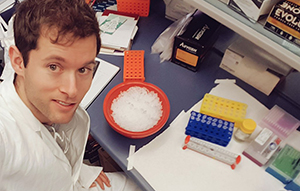 “RNAPII-dependent targeting of histone acetylation to transcribed chromatin,” by Benjamin Martin, PhD Candidate, Howe Lab.
“RNAPII-dependent targeting of histone acetylation to transcribed chromatin,” by Benjamin Martin, PhD Candidate, Howe Lab.
Monday, May 7th, 2018 at 3:00 pm, LSC #3
Read More | No Comments
Posted on April 27, 2018
 “Tools and Applications for Manipulating Platelet Function”, by Vivienne Chan, PhD Candidate, Kastrup Lab.
“Tools and Applications for Manipulating Platelet Function”, by Vivienne Chan, PhD Candidate, Kastrup Lab.
Thursday, June 14, 2018 at 12:30 pm, Room 200 Graduate Student Centre , 6371 Crescent Road.
Read More | No Comments
Posted on April 6, 2018
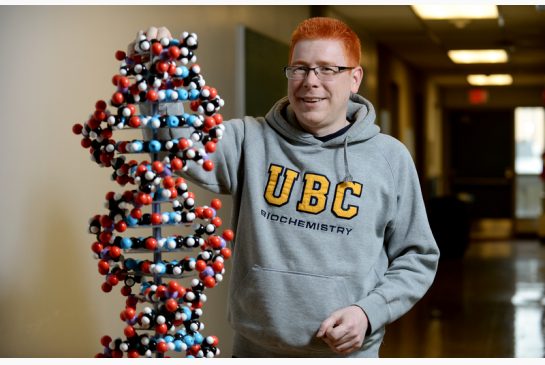
Dr. Warren Williams with a model of the structure for DNA.
UBC and BC Institute of Technology are offering a new joint Forensics Science bachelor’s program in September 2018. Dr. Warren Williams, Senior Instructor in Biochemistry and Molecular Biology, and Dr. Dean Hildebrand, Associate Dean of BCIT, Forensic Science are excited to announce this new opportunity to students. This collaboration provides a complementary environment for undergrads to take courses and training on the technical aspects of forensics at BCIT, while UBC emphasizes basic science and theory. Students will commute between the 2 campuses taking the necessary courses to earn a Bachelor of Science (Combined Honours) in Biochemistry and Forensic Science. The credential is awarded jointly by UBC and BCIT.
Read More | No Comments
Posted on April 6, 2018
 “Structural and Functional Studies of Lipid Nanoparticles”, by Jayesh Kulkarni, PhD Candidate, Cullis Lab.
“Structural and Functional Studies of Lipid Nanoparticles”, by Jayesh Kulkarni, PhD Candidate, Cullis Lab.
Friday, April 27, 2018 at 12:30 pm in Room 200 Graduate Student Centre, 6371 Crescent Road
Read More | No Comments
Posted on March 20, 2018
 “Targeting of Histone Acetylation to Transcribed Chromatin,” by Benjamin Martin, PhD Candidate Howe Lab.
“Targeting of Histone Acetylation to Transcribed Chromatin,” by Benjamin Martin, PhD Candidate Howe Lab.
Monday, March 19 at 12:00 pm Room 1416, Life Sciences Centre, 2345 Health Sciences Mall.
Read More | No Comments
Posted on March 16, 2018
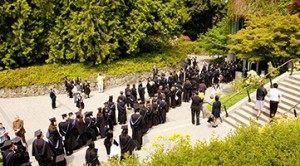
Congratulations Biochem graduates!! May Graduation, we have 2 separate days to celebrate your achievements. UBC will be conferring:
MSc and PhD degrees on Wednesday, May 23rd at 8:30 am
BSc degrees will be held on Thursday, May 31st at 11:00 am
Read More | No Comments
Posted on February 26, 2018
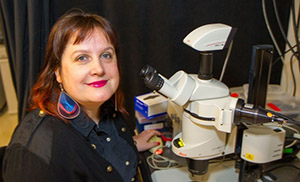 “Specialized Ribosomes: A New Frontier in Gene Expression and Organismal Biology,” by Dr. Maria Barna, Stanford University.
“Specialized Ribosomes: A New Frontier in Gene Expression and Organismal Biology,” by Dr. Maria Barna, Stanford University.
Tuesday, June 5th, 2018 at 3:00 pm, LSC#2, 2350 Health Sciences Mall.
Read More | No Comments
Posted on February 15, 2018
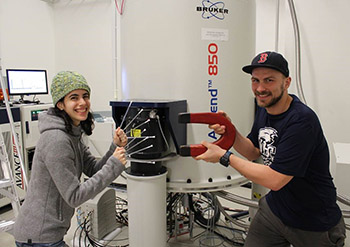
“Fuzzy interactions: Phosphorylation-enhanced DNA binding autoinhibition of Ets1,” by Cecilia Perez-Borrajeo, PhD Candidate, McIntosh Lab.
“Phase separation of a virulent ABC transporter in Mycobacterium tuberculosis,” by Florian Heinkel, PhD Candidate, McIntosh Lab.
Monday, March 5th, 2018, at 3:00 pm, LSC#3, 2350 Health Sciences Mall
Read More | No Comments
Posted on February 13, 2018
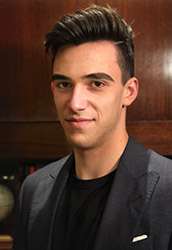 Miles Jaques, Biochemistry undergraduate student has been selected as a 2018 Wesbrook Scholar. The Premier Undergraduate Scholarships and Wesbrook Scholars are the University’s most prestigious designations, given to senior students with outstanding academic performance, leadership, and involvement in student and community activities. Congratulations Miles!!!
Miles Jaques, Biochemistry undergraduate student has been selected as a 2018 Wesbrook Scholar. The Premier Undergraduate Scholarships and Wesbrook Scholars are the University’s most prestigious designations, given to senior students with outstanding academic performance, leadership, and involvement in student and community activities. Congratulations Miles!!!
Read More | No Comments
 “Mammalian Neuraminidases in regulation of signaling an metabolism”, by Alexey Pshezhetsky, Pediatrics and Biochemistry, Université de Montréal, Anatomy and Cell Biology McGill University, Director of Elisa Linton Sanfillippo Research Lab, Sainte-Justine University Hospital Research Center.
“Mammalian Neuraminidases in regulation of signaling an metabolism”, by Alexey Pshezhetsky, Pediatrics and Biochemistry, Université de Montréal, Anatomy and Cell Biology McGill University, Director of Elisa Linton Sanfillippo Research Lab, Sainte-Justine University Hospital Research Center. “RNAPII-dependent targeting of histone acetylation to transcribed chromatin,” by Benjamin Martin, PhD Candidate, Howe Lab.
“RNAPII-dependent targeting of histone acetylation to transcribed chromatin,” by Benjamin Martin, PhD Candidate, Howe Lab. “Tools and Applications for Manipulating Platelet Function”, by Vivienne Chan, PhD Candidate, Kastrup Lab.
“Tools and Applications for Manipulating Platelet Function”, by Vivienne Chan, PhD Candidate, Kastrup Lab.
 “Structural and Functional Studies of Lipid Nanoparticles”, by Jayesh Kulkarni, PhD Candidate, Cullis Lab.
“Structural and Functional Studies of Lipid Nanoparticles”, by Jayesh Kulkarni, PhD Candidate, Cullis Lab.
 “Specialized Ribosomes: A New Frontier in Gene Expression and Organismal Biology,” by Dr. Maria Barna, Stanford University.
“Specialized Ribosomes: A New Frontier in Gene Expression and Organismal Biology,” by Dr. Maria Barna, Stanford University.
 Miles Jaques, Biochemistry undergraduate student has been selected as a 2018 Wesbrook Scholar.
Miles Jaques, Biochemistry undergraduate student has been selected as a 2018 Wesbrook Scholar.